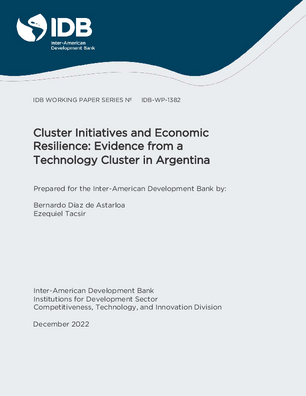Cluster Initiatives and Economic Resilience: Evidence from a Technology Cluster in Argentina
Date
Dec 2022
In this paper, we study the role of a cluster initiative in fostering economic resilience among firms in a local technology cluster in Argentina. We focus on two aggregate shocks that hit the Argentine economy, including first wave of the COVID-19 pandemic. Our analysis is based on interviews with authorities and members of the cluster initiative, local firms, and policy makers, as well as on firm-level administrative tax records. We find that the cluster organization provides members with resources that could foster resilience, including access to specialized human capital, information on business opportunities, and assistance in applying for government support programs. However, while members of the cluster organization appear to be more resilient than non-members, even
within the same regional cluster, after conditioning on firm characteristics we find little evidence of a positive association between belonging to the cluster organization and economic resilience. Members of the cluster organization are neither less likely to exit nor adapt by switching their main economic activity and did not show statistically significantly higher revenue growth than nonmembers. Member firms do appear to have been more able than non-members to keep up with tax obligations during the first wave of the COVID-19 pandemic.
within the same regional cluster, after conditioning on firm characteristics we find little evidence of a positive association between belonging to the cluster organization and economic resilience. Members of the cluster organization are neither less likely to exit nor adapt by switching their main economic activity and did not show statistically significantly higher revenue growth than nonmembers. Member firms do appear to have been more able than non-members to keep up with tax obligations during the first wave of the COVID-19 pandemic.




